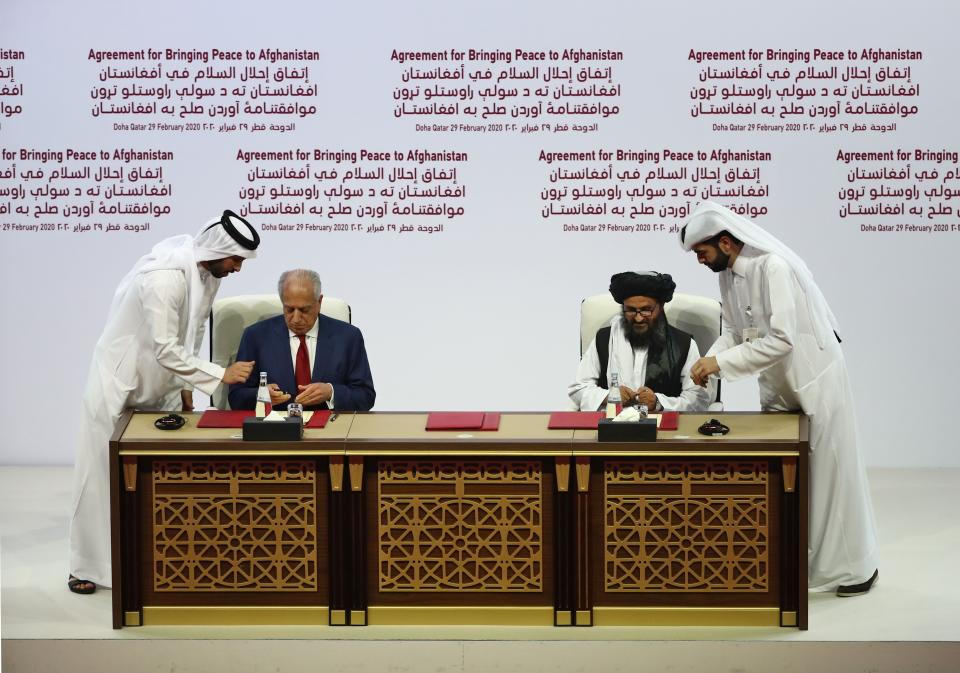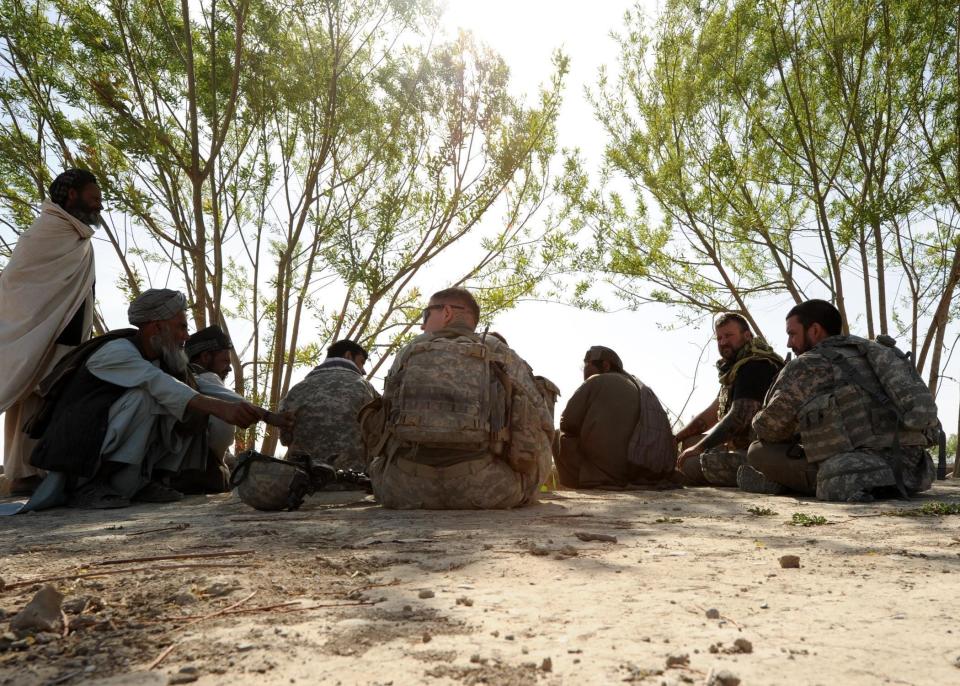‘They will slaughter us’: Afghans who worked with US beg for visas as troop withdrawal looms
WASHINGTON – In 2019, Omid Mahmoodi was working as a linguist for a U.S. Army brigade in Kabul when he overheard an Afghan soldier badmouthing the American forces.
Mahmoodi quickly alerted an Army sergeant, and the Afghan soldier was expelled from service.
"I have no doubt in my mind that Omid's actions that day saved an American soldier's life," his supervisor, Army Capt. Jonathan Flancher, wrote in a letter supporting Mahmoodi's application for a U.S. visa.
Mahmoodi is now among thousands of Afghans desperately seeking to leave their homeland as the Biden administration withdraws the last 2,500 American troops in the coming months. These Afghans fear that once U.S. forces are gone, the Taliban will sweep back into power and target them as traitors.
"You will see the dead bodies in every street," Mahmoodi said in a phone interview from Afghanistan, where he said he's already being tracked by the Taliban. "They will slaughter us."
Because of such dangers, Congress created a special visa program in 2006 for Afghans and Iraqis who worked alongside American troops in those two conflicts.
But the program is backlogged and limited. It takes an average of nearly three years for Afghans' applications to be processed, in part because of the rigorous vetting involved, according to the State Department. Right now, there are about 18,000 Afghans waiting for approval – and fewer than 11,000 slots.
"They're in a panic right now because there's been such a backlog of these visas," said Rep. Michael Waltz, R-Fla., a former Green Beret who served multiple tours in Afghanistan. "They're afraid they're going to be left behind and massacred."
Waltz and others say Congress needs to authorize more visas for the program, and the Biden administration needs to ensure these Afghans are allowed to come to the U.S.
In February, Biden signed an executive order calling for a review of the special visa program and an assessment of whether it is beset by "undue delays." That review is ongoing, according to the State Department.
"The Biden Administration is committed to supporting those who have helped U.S. military and other government personnel perform their duties, often at great personal risk to themselves and their families," a State Department spokesperson said in an email.
Afghanistan war: US lost 2,300 lives; Afghanistan lost 38,000 civilians

Will Taliban sweep back into power?
The Trump administration negotiated a peace deal with the Taliban last year, under which the U.S. agreed to withdraw all its forces and the Taliban promised to sever its ties with al-Qaida and end its attacks on American forces.
President Joe Biden set Sept. 11 as the deadline for a full U.S. withdrawal, an extension of the May 1 deadline set by former President Donald Trump. The Pentagon began drawing down forces earlier this month. But as the American military footprint shrinks, the security situation in Afghanistan has become increasingly dangerous.
Since the U.S.-Taliban deal was signed in February 2020, the Taliban have not targeted American soldiers. But the militant group has escalated its attacks on Afghan forces, and civilians deaths have spiked.
On Saturday, a bombing at a girls school killed 50 people, many of them students between 11 and 15 years old, according to the Associated Press. An Afghan government official blamed the Taliban, which denied involvement in the attack. Last week, a truck bomb killed more than 20 people, including many students who were preparing for university entrance exams.
US withdrawal: 'The progress Afghanistan has made ... will all be for naught,' retired general fears

Even as the U.S. pushes the Taliban to negotiate power-sharing agreement with the Afghan government, the militant group has increased its grip on much of the country and could regain full control once U.S. troops are gone.
Visual explainer: The cost of counterterrorism didn't end in Iraq and Afghanistan
Mahmoodi said he worked as an interpreter and cultural adviser with the U.S. military for three years. He shared dozens of photos of himself with American troops, along with certificates and letters from his commanding officers.
"The Taliban call us an infidel, they call us a spy for Americans and so many other words they have for us," he said. "If the U.S. forces leave Afghanistan ... I cannot guarantee for one minute what's going to happen with me, with my family."
A moral obligation
After Biden announced his withdrawal deadline, Rep. Jason Crow, a Colorado Democrat who also served in Afghanistan, called on the president to prioritize U.S. visas for Afghans like Mahmoodi.
"These Afghans served with courage and with the understanding that the U.S. would stand by them and provide safe haven when and if necessary. That time has now arrived," Crow and more than a dozen other lawmakers wrote in an April 21 letter to Biden.
"We must provide a path to safety for those who loyally worked alongside U.S. troops, diplomats, and contractors, and work with our international partners to provide options for Afghans who would face a credible fear of persecution if the Taliban return to power," the letter says.
Waltz knows firsthand how crucial it has been for American troops to have local partners on the ground in Afghanistan.
"Not having them with us would be like not having radios. You just can't communicate" either with Afghan civilians or with allied Afghan soldiers, he said. "Words like ceasefire, fire, duck are pretty important when you're in joint operations."
Waltz said these Afghans put their entire families in jeopardy when they sign up for service.
"Most of them cover their faces and try to kind of (hide) their identity," he said. "They often have a cover story back in their villages and with their families that they're working with an ... international NGO or nonprofit."
Waltz has worked to help several Afghans navigate the U.S. visa program over the years, and he said the U.S. has a moral obligation and national security imperative to help as many as possible. He fears U.S. forces will have to go back into Afghanistan if al-Qaeda, the terrorist group that carried out the Sept. 11 attacks, re-emerges as a threat to the United States.
"The message that we're sending now (is) 'We're not standing with you ... and you could be left behind, very exposed, hunted down,' " he said. That will make it "much more difficult when we have to go back again to find local allies and convince people to trust us."
Waltz says Congress will almost certainly authorize more visas, but he's not sure it will happen in time for those Afghans currently waiting. He said the Biden administration should set aside some slots for Afghans from the regular U.S. refugee resettlement program.
A National Security Council spokesman said the Biden administration is prioritizing the visa issue and is eager to work with Crow and other lawmakers.
“The United States will remain deeply engaged with the government of Afghanistan and committed to the Afghan people, who have made extraordinary sacrifices during this conflict,” the council spokesperson said.
The State Department spokesperson said everyone involved in the Afghan visa program is aware of the threats to U.S.-affiliated Afghans. "The department constantly seeks ways to improve the SIV process while ensuring the integrity of the program and safeguarding national security."
Refugees: Biden says he will raise refugee cap to 62,500 but warns the US will not be able to meet new number
‘Life or death’ consequences
Some are calling for a more dramatic step: an emergency evacuation of Afghans who assisted American troops.
"It's life or death right now," said Chris Purdy, project manager of the Veterans for American Ideals program at Human Rights First, a nonprofit organization based in New York.
Purdy, who served in the Iraq War, said he welcomes efforts to increase the number of visas, but it's not enough. At its height, the special visa program only processed about 4,000 applicants a year, a rate that would leave thousands of Afghans stranded.

"It is becoming very clear that our immigration infrastructure cannot handle a normal situation, and we need to think of some drastic measures," he said. "That's why we're proposing a general evacuation" of American-affiliated Afghans.
More than a dozen veteran and military advocacy groups have signed a letter to Biden calling for an evacuation. Among the signers: Veterans of Foreign Wars, Iraq and Afghanistan Veterans of America, and several smaller groups.
"This is a big job, and we expect you to command the use of the military’s logistical expertise and American diplomatic power to execute it," says the letter, obtained by USA TODAY. "Our experience tells us that the Department of Defense is up to this task."
SUBSCRIBE: Help support quality journalism like this.
The veterans groups note that the U.S. military evacuated approximately 130,000 refugees from Vietnam in 1975, as well as thousands from Iraq in 1996 and Kosovo in 1999. Many were flown first to Guam, to be screened for resettlement in the U.S.
"It's something in the post 9/11 world that becomes much more difficult to do politically," Purdy conceded. That's why he helped organize the May 7 letter to Biden. "Our goal here is to say, 'If you're afraid of a political backlash, the veteran community is on your side, they have your back.'"
It's not clear if Mahmoodi would be helped by any of these measures. He said he was abruptly terminated from a position with the CIA last year, and the State Department recently turned down his visa application.
Flancher wrote a letter protesting the visa denial, saying he trusts Mahmoodi "wholeheartedly" and "would work with him again if I could."
But Mahmoodi is pessimistic about his prospects of immigrating to the U.S. – and about his future in Afghanistan.
"Right now, my village is completely controlled by Taliban," he said.
This article originally appeared on USA TODAY: Afghanistan troop withdrawal leads translators to beg US for visas

